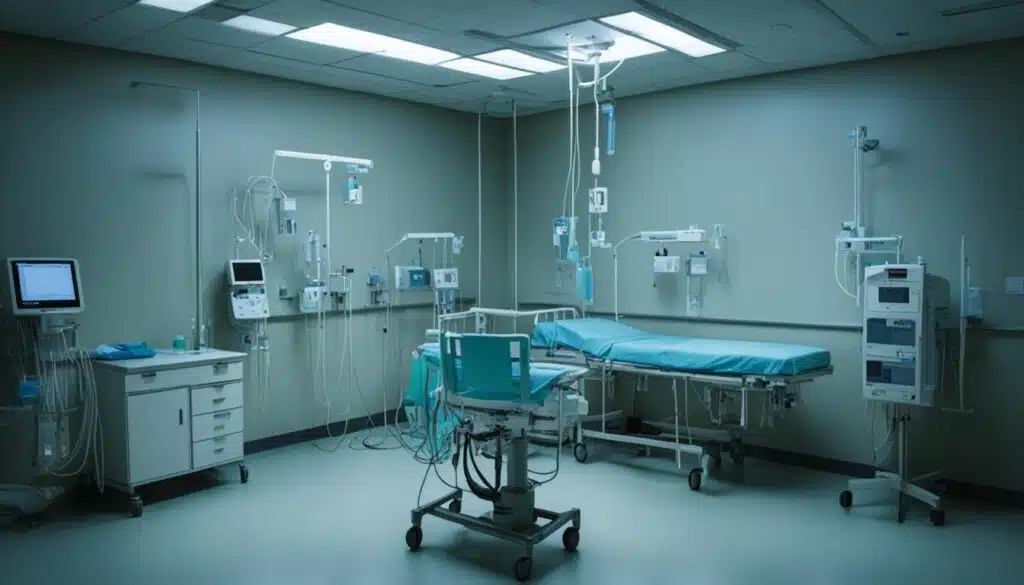The recovery time after major surgery varies a lot, depending on the procedure. Open surgeries, with bigger cuts and more tissue damage, need more time to heal than minimally invasive ones. For instance, open-heart surgery usually takes 3-6 hours and needs 6-8 months to recover. In comparison, recovering from a vasectomy, a 20-30 minute procedure, takes only 2-7 days.
The time needed to recover is also linked to the operation’s duration and the surgical impact. Patients who have major surgeries like cancer treatment often recover slower than others. It includes those with outpatient or elective surgeries. It’s important for patients to know about their type of surgery and the expected recovery process. This helps them plan their post-surgical care better.
Key Takeaways
- The type of surgery performed has a significant impact on the recovery time.
- Open surgeries with larger incisions typically have longer recovery periods than minimally invasive procedures.
- Major surgeries like open-heart surgery can take 6-8 months to recover, while less invasive procedures have shorter recovery times.
- The length of the operation and the extent of the surgical intervention are key factors in determining the recovery timeline.
- Understanding the specific type of surgery and anticipated recovery process is crucial for patients to plan their postsurgical care.
The Impact of Surgery Type
The surgery you have affects how quickly you’ll recover. Open surgeries take more time because they need big cuts and affect more of your body. However, minimally invasive procedures, like laparoscopic or robotic surgery, make smaller cuts and heal faster.
Open Surgeries vs. Minimally Invasive Procedures
Open general surgery for things like cancer treatment may need hours to finish. They also need a longer time to heal. But, minimally invasive surgeries let you go home the same day or after a short hospital stay.
Common Procedures and Their Recovery Times
The time it takes for surgery and how much they do affects your recovery. Vasectomy, a simple surgery, only needs 20-30 minutes and up to a week to heal. On the other hand, something like complex open-heart surgery takes longer to heal, from 6-8 months.
| Surgical Procedure | Typical Duration | Recovery Time |
|---|---|---|
| Vasectomy | 20-30 minutes | 2-7 days |
| Laparoscopic Cholecystectomy (Gallbladder Removal) | 1-2 hours | 1-2 weeks |
| Hernia Repair | 1-2 hours | 2-4 weeks |
| Open-Heart Surgery | 3-6 hours | 6-8 months |
The American College of Surgeons and other groups outline how long it takes to heal from various surgical procedures. Always ask your surgeon about what to expect after your surgery.
Age and Overall Health

The patient’s age and overall health play a big part in how quickly they heal after surgery. Generally, younger patients recover faster, especially if they’re under 60. This faster recovery is because younger bodies heal and grow back tissue quicker.
Younger Patients and Recovery Speed
People in their 20s, 30s, and 40s usually recover quickly from surgery. Their bodies tend to be strong and ready to overcome the stress of an operation. Also, they’re less likely to have health problems that could slow down their healing.
Chronic Conditions and Comorbidities
Counting in, those with existing health problems might find it harder to recover. For example, diabetes, heart diseases, or lung problems can make healing slower. These issues might also increase the chances of facing complications after surgery.
| Characteristic | Younger Patients | Older Patients |
|---|---|---|
| Recovery Time | Faster | Slower |
| Healing Ability | More Efficient | Less Efficient |
| Chronic Conditions | Fewer | More |
| Risk of Complications | Lower | Higher |
Knowing how age and health affect recovery helps medical teams plan treatment better. This helps each patient have the best chance of doing well after surgery.
Patient Commitment to Recovery
Recovering well from surgery is not just up to the surgeon or the type of surgical procedure. The patient’s dedication to their recovery is key. It helps to reach the best results and lessen the recovery time.
Following Medical Instructions
It’s crucial for patients to closely follow the post-surgery directions from their healthcare team. These may cover how to care for the wound, manage pain, do physical therapy, and what to eat. Not sticking to these instructions can cause issues like surgical site infections or slow healing. This can make the recovery time longer.
Lifestyle Factors and Habits
A patient’s lifestyle choices are also very important. Things like nutrition, physical activity, stress management, and sleep quality affect the healing process. If a patient focuses on being healthy in these areas, they can recover faster. They’ll also see better results in the long run.
Complications and Setbacks

The path to recovery after surgery is usually slow and steady. Yet, complications and setbacks can sometimes change that. These issues vary, from small problems like wound infections to larger ones needing more surgical procedures or longer recovery time.
Wound Infections and Healing Issues
Wound infections are a common post-surgery problem. They slow healing and may cause other issues. For example, they might require more surgery or longer hospital stays. Things that heighten the risk of wound infections are poor patient hygiene, medical conditions, and bad surgical techniques. Patients should pay close attention to post-operative care instructions to cut down on these risks.
Unexpected Complications and Their Impact
Sometimes, patients face issues they didn’t expect during or after surgery. These can really slow down their recovery and affect the outcome of the surgery. Problems might be bleeding, organ damage, or blood clots. Dealing with these issues could mean more surgery, longer hospital stays, or intensive care. The impact of these surprises can be big, for the recovery time and the long-term health.
So, it’s key that the complications are managed well in the post-operative care. Patients need to closely cooperate with their surgeon and other health experts. It’s important to spot and avoid any risks or setbacks during recovery.
Surgery
There are two main types of surgical procedures: open surgeries and minimally invasive procedures. In open surgeries, doctors make a big cut to reach the problem area. This can cause more harm to the body and take longer to heal. However, minimally invasive surgical techniques, like laparoscopic surgery, use small cuts. These methods mean less damage, a quicker recovery, fewer risks, and better results for patients.
Types of Surgical Procedures
The kind of surgery a person needs depends on their health issue, which part of the body needs treatment, and the doctor’s focus. There are several types, including general surgery or cancer surgery. A group of experts, like surgeons and nurses, always work together. They do their best to take care of the patient before, during, and after the surgical process.
Preparing for Surgery
Getting ready for surgery involves many steps. The patient may need to do medical tests and talk to their doctor first. This is to make sure they’re healthy enough for the procedure. Sometimes, lifestyle changes are also needed, such as quitting smoking. These changes can boost the chance of a good result. Patients also receive clear instructions on how to get ready. This includes what to eat, what medicines to take, and how to look after themselves after surgery.
Postsurgical Care and Monitoring

After surgery ends, the care and watch shift to make recovery smooth and successful. The amount of care needed can be a lot or a little. This depends if the surgery happened quickly or required a hospital stay.
Outpatient Surgery Recovery
People getting or other quick leave the same day. They talk with their and at length about how to look after their incisions. They also learn how to deal with any pain and know what severe problems to look for. They must keep up with visits to the to make sure they heal well.
Inpatient Surgery Recovery
If the surgery is more complex, like or removing , stay in the hospital is longer. They’re watched closely by the for days or weeks. The team checks vital signs, pain, and how the patient is generally doing. If needed, they adjust and for better recovery. The team and work together to ensure the best recovery possible.
After the surgery, how it was done doesn’t matter as much. The important thing is keeping an eye on the patient. This is to catch and fix any problems early and keep the patient healthy and happy.
Also Read : Short-Term Vs Long-Term Prognosis In Severe Infectious Diseases
Rehabilitation and Therapy
Rehab and therapy are key in bouncing back from surgery. Depending on the operation and what the patient needs, different rehab forms are advised. This aims to help people get their strength back, move better, and do daily tasks again.
Physical Therapy for Strength and Mobility
Physical rehab is vital, especially after orthopedic, heart, or brain surgeries. Competent therapists craft exercises specifically for the patient’s condition. They do this to increase strength, movement, and overall physical health.
Occupational Therapy for Daily Activities
Occupational therapy helps with everyday activities. It’s crucial for those with upper body, hand, or thinking issues after surgery. Therapists work closely with patients to pinpoint challenges and find solutions. This might include changing the home setup or using special tools.
Speech Therapy for Head and Neck Surgeries
If someone has had surgery on their head or neck, like for cancer or facial healing, speech therapy might be needed. Therapists create tailored plans that could involve speech exercises or eating tips. The goal is to improve talking, eating, and any related functions.
FAQs
Q: How long does it typically take to recover from major surgery?
A: The recovery time from major surgery can vary depending on the type of surgery, individual health factors, and the complexity of the procedure. In general, it may take several weeks to a few months to fully recover.
Q: What role does the surgeon play in the recovery process?
A: The surgeon plays a critical role in overseeing the patient’s post-operative care, monitoring healing progress, prescribing medications, and recommending follow-up appointments to ensure a smooth recovery.
Q: What are some common types of major surgeries that require a significant recovery period?
A: Major surgeries such as reconstructive surgery, robotic surgery, general surgery, vascular surgery, surgery for cancer, and colon and rectal surgery often require a longer recovery period due to the complexity of the procedures.
Q: How does the use of minimally invasive techniques impact recovery time?
A: Minimally invasive surgery techniques can lead to a shorter recovery time compared to traditional open surgeries. These approaches typically result in less pain, smaller incisions, and faster healing.
Q: Are there any factors that can help speed up the recovery process?
A: Factors such as following post-operative care instructions, maintaining a healthy diet, staying hydrated, getting enough rest, and attending physical therapy sessions can help accelerate the recovery process.
Q: What should patients expect in terms of pain management during the recovery period?
A: Patients can expect to receive pain management medications prescribed by their surgeon to help alleviate post-operative pain. It is important to communicate any discomfort or unusual symptoms to the medical team.
Q: How important is it to attend follow-up appointments after major surgery?
A: Follow-up appointments are crucial for the surgical team to monitor healing progress, address any concerns, remove stitches or staples, and make recommendations for additional care. Skipping follow-up appointments can hinder the recovery process.





